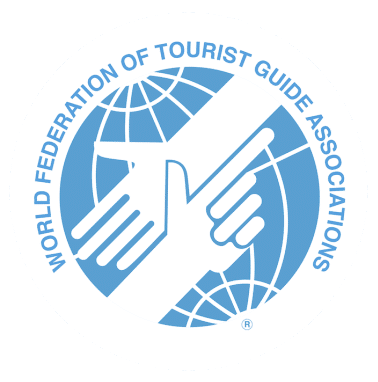ince 1985 the World Federation of Tourist Guide Associations (WFTGA) has brought together professional tourist guides from every region of the world to advance recognition of our profession, set and share standards, and foster excellence in training. The Federation emerged from the first International Convention of Tourist Guides in February 1985 and was subsequently registered as a non-profit under Austrian law after the second convention in Vienna in 1987. Our registered office remains in Vienna.
Our work is guided by the WFTGA Code of Guiding Practice: professional identity and knowledge; ethics, fairness and sustainability; cultural sensitivity and political neutrality; and strong practical guiding competences, including digital responsibility. We collaborate with partners across the tourism ecosystem and are recognised internationally as an NGO in Operational Relations with UNESCO and as an Affiliate Member of UN Tourism (UNWTO).
A core pillar of WFTGA is training. Through our International Training Centres (ITCs) and global Train-the-Trainer network, qualified guides and future trainers build skills that are immediately transferable to the field. Our longest-running ITC operates in Nicosia, Cyprus, and we have since added further centres, including Yerevan, Armenia.
Milestones — Timeline
1985 — Origins
The first International Convention of Tourist Guides takes place in February. Delegates propose establishing a global federation of professional tourist guides.
1987 — Registered in Austria
Following the second convention in Vienna, the Federation is registered as a non-profit organisation under Austrian law; Vienna becomes the legal seat.
Early 1990s — International Tourist Guide Day (ITGD)
Associations worldwide begin marking ITGD on or near 21 February each year, celebrating professional skills and public service in local communities.
1991 — Our emblem
The WFTGA logo—symbolising the Hands of Friendship and the Hand of Guidance stretched across the world—is adopted, encapsulating our values and global vocation.
2000s — Training scales up
WFTGA expands structured training and assessment, building an international cadre of trainers and course leaders.
2006 — Cyprus International Training Centre (ITC)
Our ITC in Nicosia opens its doors and has since hosted multiple cohorts of guides and trainers in partnership with academic institutions.
2010s — Global recognition and new centres
WFTGA affirms its status as an NGO in Operational Relations with UNESCO and an Affiliate Member of UN Tourism (UNWTO), while establishing additional ITCs, including Yerevan (first courses held in 2014).
2024 — Siracusa, Italy
Our biennial world convention—“the family meeting of tourist guides”—welcomes hundreds of participants from over sixty countries. Pre- and post-tours showcase host-region excellence and sustainable practice.
2026 (planned) — Fukuoka, Japan
The next WFTGA Convention is scheduled for 9–13 February 2026, continuing our tradition of professional exchange, cultural immersion and global networking.
Why this history matters
From a single proposal in 1985 to a worldwide learning and advocacy network, the WFTGA has consistently championed standards, ethics and the public value of professional tourist guiding. Our story is one of collaboration: sharing knowledge, celebrating cultural heritage responsibly, and helping visitors understand places—and people—with accuracy, empathy and care.
